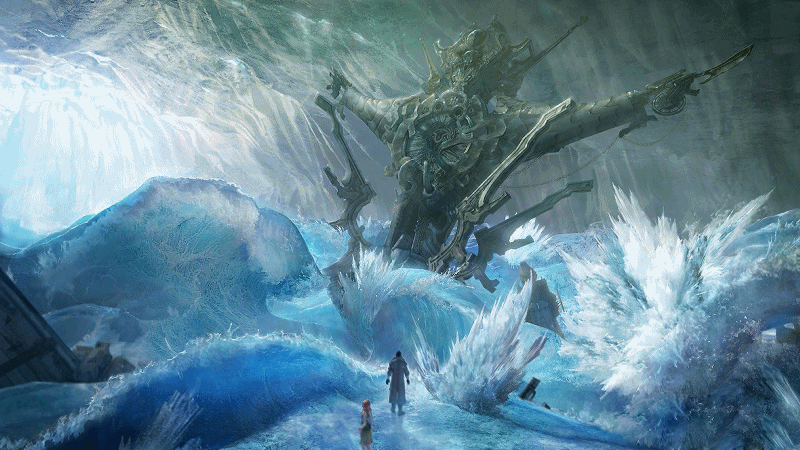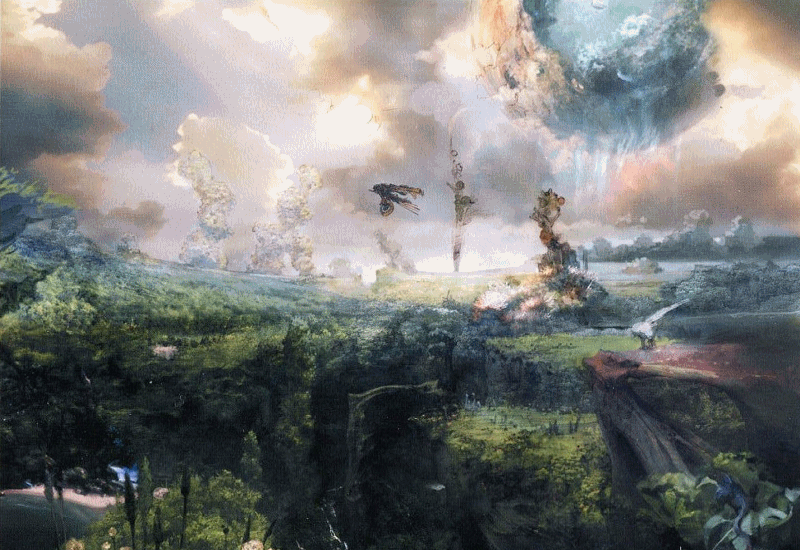 Final Fantasy 13 is still widely considered the worst in the whole series, and rightly so to an extent. It’s pretty clunky and bad as a “game”, but I still do believe that its setting and mythology are rather interesting and the better developed compared to all the other games in the series.
Final Fantasy 13 is still widely considered the worst in the whole series, and rightly so to an extent. It’s pretty clunky and bad as a “game”, but I still do believe that its setting and mythology are rather interesting and the better developed compared to all the other games in the series.
The story in the first FF13 is rather convoluted and it is true that for the most part it makes no sense, but there are aspects of it that are either misunderstood or under appreciated. Recently I’m having fun replaying the first System Shock and it’s another of those games with a brilliant structure and flow. You are alone on this space station, waking up after months of coma. The station is desert and overrun by hostile mutants and robots. All the “plot” and sense of direction is delivered through audio logs that you find around. Each audio log has a date, and you can explore a level in a non-linear way. So it’s like collecting random pages of a book, slowly putting them together. These disconnected pieces eventually form a more comprehensible puzzle as these logs are organized and listed by date, so you can rebuild the chronology of what happened and figure out what you are supposed to do next. FF13 has a somewhat similar structure in the sense that the events that lead up to the events at the beginning of the game are slowly rediscovered through the first part of the game. When the game starts the characters don’t know each other, but all of them are quickly brought together. Instead through the flashbacks we see the story from each character’s perspective, but each adding to a bigger picture and leading up to the big convergence that starts the game. While this is less functional than System Shock, it still allows the game to start big, in medias res, and then start to map out the context and everything else. It sets the characters and then attempts to build a sense of place.
This character-level perspective, where for the most part the characters proceed without any real clue of what they are supposed to do, is sustained through the whole game, including the end. What’s interesting for me is that this plot forms like an “inner circle” that is contained within bigger plots, Grand Scheme of Things, that involve the gods of FF13 mythology. Character-level drama is subordinate to the hidden god’s game in the background. One of the plot points that gets criticized the most is how these gods pick and brand human beings to accomplish some tasks. These tasks are obligatory, in the sense that often they have time limits, and if an human doesn’t fulfill his mission then he gets turned into a soulless monster. Yet the “silly” point is that these agents of a god aren’t given a clear mission. They are left basically clueless trying to figure out in the first place *what* they are supposed to do. Secondarily, this is linked to other themes of freedom: whether or not they could free themselves from the will of the god, act of their own free will, or just being puppets. While all this ambiguity is usually seen as just plot that makes no sense, it’s instead ambiguity that preserves real-life themes. The questions that the characters ask themselves in the game are the questions you wonder about outside the game. Ambiguity and uncertainty are what dominate a life. You are left alone giving an answer to your questions, and even if you find one, it’s never conclusive or completely satisfying. The gods in the game structure and condition the life of the characters as a real world does with its imposition. But the gods themselves do not give answer.
At the end of the game the characters face the gods in battle. It’s a deliberate attack on the imposed structure. A rebellion against control, and against the ambiguity that was imposed on them (even if they end up fulfilling exactly the god’s agenda). They somewhat “self-depend”, find strength within themselves and all the typical idealist babble you expect from a game. Find the truth within yourself, dream, hope and whatnot. It all becomes really hard to follow but if you push away all this typical nonsense and get the actual quotes, things become interesting again.
A heaven.
Yet it must fall ere we be saved.
Too frail a shell, and humans should not thrive.
Too stout a shell, and they would not die.
Slaughter and salvation.
The weak theme here is the dualism good/evil. It’s a conflict within the god and it’s not well realized, but the interesting part is before. A “heaven” is the place that the gods have built for human beings. A place for them to live, protected from the hostility of the world outside. This is a “real” theme, in the sense that human beings are in conflict with their environment, and have to conquer and reshape it in order to survive. In this case the gods protect human beings. If this “shell” is too weak then humans die, because they are too exposed to the world outside (in FF this is unsubtly made real by having the world overrun by huge monsters). But if its too strong, then they wouldn’t develop, become stronger. In the ideal evolution of life the hostile world is necessary for life to develop. The struggle and pain are necessary for growth and improvement, to impose the will to move forward, to act. Nature is always cruel, because it simply follows its own cynical rules. In this case the god simply voices the dualism that is implicit in nature, when nature is observed by the human, and so “judged”. The ambiguity in life is simply projected onto a vessel, a god, then given voice through the god’s speech.
After that, the god speaks some more of the relationship between humans and gods (hint: fal’Cie = gods, l’Cie = humans used by a god as agents):
Have you ever paused to consider our reason for making l’Cie of men? We fal’Cie are crafted for a single purpose and granted finite power to that end. With men it is not so. Men dream, aspire, and through indomitable force of will achieve the impossible. Your power is beyond measure. We take l’Cie that we might wield such strength.
Men dream, aspire, and through indomitable force achieve the impossible. Your power is beyond measure.
We take l’Cie that we might wield such strength.
Through you we obtained freedom from our bondage.
So the gods are single-purpose, created to achieve something and nothing else. What’s the theme here? Determinism. The gods don’t have free choice. They are bound to their single mission, they are built as tools, shaped exactly for one purpose, given no more and no less power than what’s required to achieve it. So this is put as if the gods envy the power and freedom of men. And what’s interesting, even if not “canon” with this mythology, is considering all this in the guise of Bakker’s “WHAT DO YOU SEE?”. The gods, in mythology, and in mythology as something created by men, are vessels that give us answers and revelations. But we are the voice of those gods. These gods are mere mirrors. They need our eyes to see, they need our voice to speak. The silliness of a god speaking aloud is the pretense of finding a voice. The god doesn’t know what he’s going to say before the voice is heard, because the god is a receptacle.
Even in that quote we get again more of the idealistic babble. Men through indomitable force achieve the impossible, power beyond measure. But within Final Fantasy mythology, this has a lot more actual substance. Men, contrary to gods, have a “soul”. It’s because they have a soul that they can tap that source of “power beyond measure”. A source that can’t be predicted, that can’t be manipulated by a god. Something that lets men escape, be free. Being able to self-determine. Only men have power beyond measure because only men have a soul, isn’t this what most of us actually believe?
I have written in the past about this simple but powerful scheme to explain the “structure of the world”, and the place human beings have in the Big Picture. I’ve said that the Kabbalistic god is “compatible” with science. Why? Because science assumes the system of the world is completely closed, without any metaphysical interference. It means that rules are discovered, but not invented. And those rules can’t change, unless subject to a bigger system that also needs to be explained. The Kabbalistic god is compatible with this, because after the world is set in motion, that god can’t interfere. So, looking from the “inside” of this world, the god is unreachable, out there. That god doesn’t “matter”. A world without metaphysics, so without any sort of magical or spiritual interference, is the world of science. All this is important because it’s ordered in the scheme of inside/outside. The scientific, deterministic world of science has only one “inside”. This because an interference from the outside breaches the system. It means that spurious elements are infiltrated, added in the system, and so dynamically changing the system itself. It’s meta-physical interference (derailing: I should make a case of changing “Postmodernism” to the more telling “Meta-modernism”).
Now if we consider human beings as having “free will”, and so real choice, we assume that the brain is its own system that is ADDED to the system of the world. Reality becomes: system + human being. Every human being, so, can influence the system, bring CHANGE to it. But this is our first-person perspective. We know instead that from the perspective of the system itself, we aren’t “added”, but we are simply, always have been, and always will be, just more environment of that system. It means that rules of cause and effect don’t stop when they move through us, get manipulated, and then come out differently, but instead they flow, through the world as through of us. We are still cause and effect, our brain is cause and effect, our thoughts are cause and effect. Formulating a more intuitive, “lite” version of Blind Brain Theory, I could say that, like theory of Chaos, we are only able to backtrack so much cause and effect. After a certain threshold we just can’t grasp the exponential growth of dependencies that rule the world. This means that past this threshold all becomes and indistinguishable blob. And since we can only backtrack a very small minority, and only a few steps back, of our own thoughts, it means that we are not “aware” of the true origins of cause and effect. And without an origin, we claim it as ours. “We” decide, we feel, we are. Because we are that threshold past which the world is too complex to use and realize.
Back to the canon of FF13 mythology, the soul in a human being works in the guise of a tunnel, that connects a man to a metaphysical realm of “Chaos”. The source of that power unique to men, is Chaos. The unpredictability. Chaos in this mythology is synonym of free will. It is what escapes manipulation and determinism. Why is it so? Because this tunnel/soul breaches the closed system of the world, it punches holes through it. It connects the world to a metaphysical dimension that holds Chaos. By breaching the system the determinism is defied, because elements from outside the system are brought in, infiltrated through the soul tunnel, and so the metaphysical realm of Chaos interferes with the real world, brings change, achieves the impossible (or: breaks the deterministic equilibrium and predictability, and so, in this case, violates the order as set by the gods, who instead are deterministic, as explained above).
Final Fantasy XIII’s mythology is praiseworthy because it can actually supports, and openly so, this kind of structure. It’s fairly brilliant. The fact that in the game the characters are “terrorists” whose ultimate mission is to subvert the status quo is rather fitting with the idea of “agents of Chaos” that infiltrate the world, which is what actually happens on the mythological layer. That theme becomes plot.



One Trackback/Pingback
[…] the other blog I made a parallel between the flow of System Shock and Final Fantasy 13, but that flow is really clever. The audio logs you find scattered have a date, but you stumble on […]